Q&A: What went wrong for the DUP's shortest-serving leader?
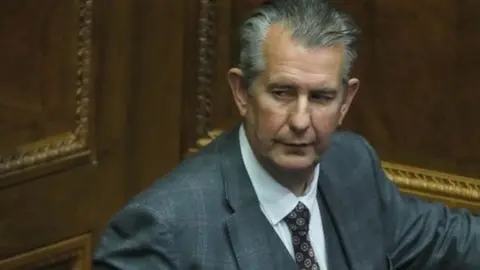 Brian Lawless
Brian LawlessEdwin Poots has resigned as DUP leader after just 21 days in the job following an internal party revolt.
He had been elected in the first leadership contest in the DUP's 50-year history, with predecessors chosen by the party's top ranks.
So what went so wrong, so quickly, for the party's shortest-serving leader?
Why did the DUP turn against him?
Edwin Poots was under huge pressure having agreed a deal with Sinn Féin and the Westminster government to ensure Paul Givan became Northern Ireland's first minister.
This move was voted against by most of his elected colleagues.
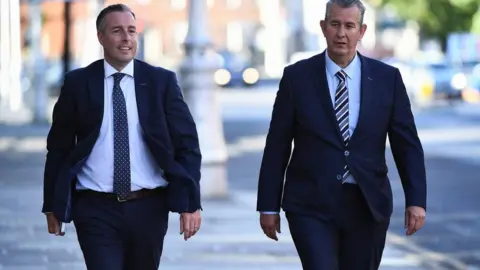 Reuters
ReutersHow did he come to power?
Mr Poots, who took over as leader from Arlene Foster in May, had narrowly defeated Sir Jeffrey Donaldson in a leadership vote.
The ousting of Mrs Foster was decisive, and also strikingly brutal.
On 28 April 2021, the former DUP leader resigned within 24 hours of it being widely leaked to the media that a significant number of elected representatives had signed a letter of no confidence.
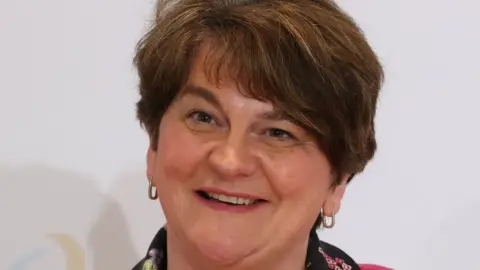 Liam McBurney
Liam McBurneyFormer party leader Peter Robinson branded the manner of the heave, which was instigated by Mr Poots' supporters, as "publicly humiliating, vindictive and needlessly nasty".
That view was shared by a great number of DUP members - some of whom had their own issues with Mrs Foster's leadership, but who nevertheless believed she should have been treated with more respect.
Mrs Foster shared her thoughts about the nature of her ousting with the BBC's Newscast programme.
"I think I said a couple of days after what had happened that politics is brutal, but even by DUP standards, it was pretty brutal," she said.
On Thursday, Mrs Foster enjoyed a spot of lunch with a friend as the DUP party squabbled over the leadership of the party.
In a tweet, she said "I hope everyone is having a nice day".
Allow X content?

What was wrong with Mr Poots' selection of ministers?
Mr Poots' selection of a ministerial team was always going to be a balancing act.
He had to reward those who backed him, but many believe he also needed to conciliate those who were unhappy with his election.
While he did ultimately appoint a few supporters of Sir Jeffrey Donaldson to lower level assembly roles, the vast majority of posts were given to his own supporters.
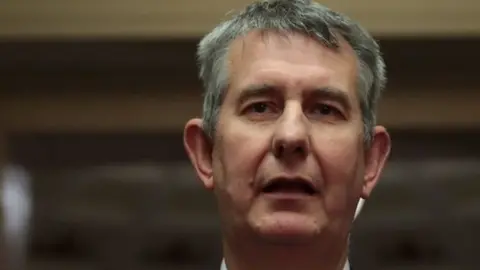 Liam McBurney/ PA
Liam McBurney/ PAThe reaction to this was summed up by two ministers sacked by Poots, with Diane Dodds and Peter Weir both accusing him of failing to sufficiently reach out.
Mrs Dodds said it was "regrettable" the new team did "not match the rhetoric about healing and bringing the party together".
Significantly, there was no move to bring Sir Jeffrey into a prominent role in the Poots' camp after a closely fought leadership election.
Why the big fuss over Irish language?
The policy stance that ultimately undid the politician was the one he took on Irish language.
Mr Poots' insisted on pressing ahead with the nomination of his close friend Paul Givan as Stormont's first minister, despite opposition from a majority of his elected representatives who were deeply unhappy.
The vast majority of DUP assembly members (MLAs) - 24 to four - voted against Mr Poots' decision during a meeting ahead of the special assembly sitting.
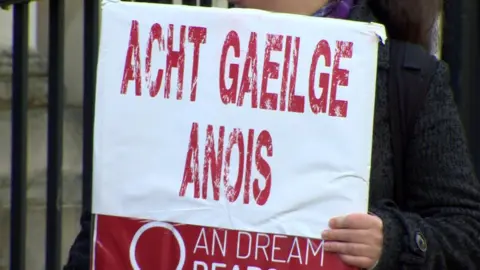
Sinn Féin had made clear it would only re-nominate Ms O'Neill if the party secured a guarantee that language legislation agreed in the New Decade New Approach Deal in 2020, that restored power-sharing, would be implemented.
A refusal by Sinn Féin to nominate would have crashed the NI Executive and prompted a snap election.
Mr Poots said he would implement the legislation, but did not assure Sinn Féin he would do it in the current assembly mandate.
In response, Sinn Féin asked the UK government to introduce the laws at Westminster instead.
In the early hours of 17 June, Northern Ireland Secretary Brandon Lewis not only agreed to Sinn Féin's request, but also announced Mr Poots was happy to proceed with reconstituting the NI Executive on that basis.
This move came as a shock to many within the DUP ranks and culminated in the decisive meeting at DUP party headquarters in east Belfast the following evening, after which Mr Poots resigned.
Who is likely to replace Edwin Poots as DUP leader?
Sir Jefferey Donaldson has been tipped as the clear frontrunner for the leadership of the party, as well as some suggestions that East Antrim MP and long-standing DUP stalwart Sammy Wilson could be in the running.
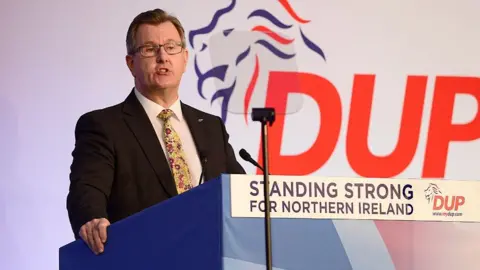 PACEMAKER
PACEMAKERThe Lagan Valley MP narrowly missed out in the last leadership contest to Edwin Poots by just two votes on 14 May.
When will the next leader be elected?
A big question for the DUP in the short term is just how quickly Edwin Poots can feasibly be replaced as leader.
It is likely party officers will outline the timetable for that process, proposing a cut-off date for anyone interested in the position, which could be as soon as next week.
After passing that stage, the party will then assess who is in the running for the leadership, and then decide how that is going to be ratified or rubber-stamped.
The party has been in the headlines for all the wrong reasons recently, and the DUP will understandably want to move on from this difficult period as soon as possible.
What now for the new first minister and the party?
Newly elected First Minister Paul Givan finds himself in an uncomfortable position.
The very man who placed him there a day ago has been unceremoniously dumped from his leadership role by the party.
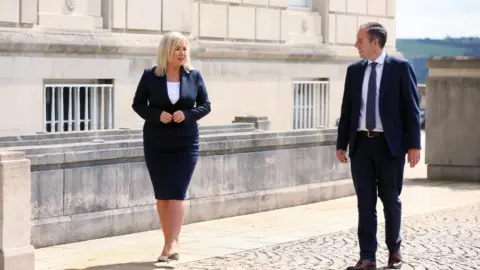 PAcemaker
PAcemakerWhoever takes on the leadership position will need to make a decision on how best to handle the first minister conundrum.
Unless Paul Givan resigns from his post he will remain as first minister.
If he was to resign, it would then trigger a seven-day count down for another first minister to be appointed.
Failure to do that, will result in Northern Ireland Secretary Brandon Lewis calling an election.
Some within the party believe Sir Jeffrey Donaldson could help bring stability back to the party.
Sir Jeffrey may see Mr Givan remaining on in the first minister post as the best way to steady the ship.
